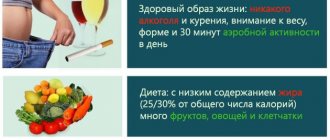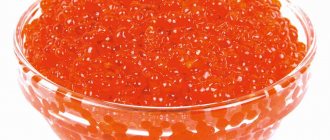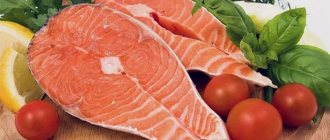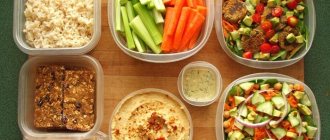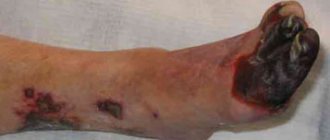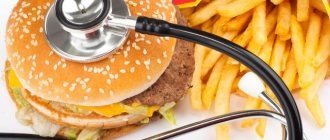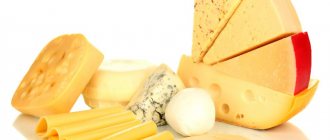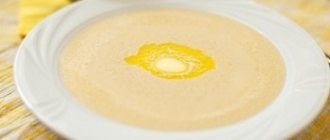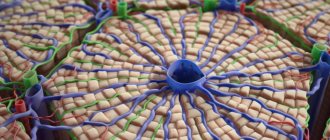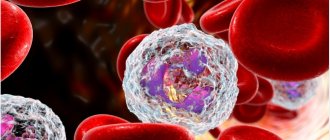To feel healthy and avoid the development of dangerous diseases such as atherosclerosis, stroke, ischemia and heart attack, you should maintain healthy arteries and heart. Products that lower cholesterol and cleanse blood vessels are useful not only at the stage of treating hypercholesterolemia, but also for preventing the formation of atherosclerotic plaques.
Today we will talk about a list of such healthy foods, what should be avoided if you have high cholesterol levels, and about following the general principles of a balanced diet.
Nutritional features for hypercholesterolemia
- Fractional meals. The basic principle is to eat even when you don’t feel like it, but in small portions (100-200 g), 5-6 times a day.
- Ease of preparation. If you have high cholesterol, fried, smoked, pickled foods, and any preserves are strictly prohibited.
- Breakfast. Should consist of carbohydrates - porridge cooked in water or low-fat milk.
- Dinner. Must include soup or broth and hot dishes, for example, boiled fish or meat with a side dish.
- Dinner. Preference should be given to salads, vegetables with fish or meat.
- Lunch and afternoon tea. Fruit salads, fruits, fresh vegetables, dried fruits, nuts, and dairy products are ideal as snacks.
- 1 hour before bedtime, it is recommended to drink a glass of kefir, natural yogurt or freshly prepared vegetable juice.
- You need to drink about 1-1.5 liters of water per day. You cannot replace it with tea, compotes, or herbal decoctions.
- It is very important to reduce your consumption of animal fats by at least a third.
- It is advisable to completely give up coffee. Or drink no more than 1 cup a day of a brewed natural drink. Ginger tea has a good tonic effect. This is a good alternative to invigorating, but harmful coffee for high cholesterol.
When preparing a diet, women are advised to include more soy products containing phytoestrogens in the menu, consume sprouted wheat grains more often, and drink more natural juices. It is advisable to reduce sugar consumption and move more.
Men should carefully monitor their protein intake, eat more legumes and fish, give up salt or limit its amount to 8 g per day. Along with proper nutrition, it is advisable to completely give up bad habits (smoking, alcoholic drinks).
Very often, hypercholesterolemia is combined with pathologies of internal organs: high blood sugar, disturbances in the functioning of the thyroid gland, liver, and kidneys. This situation requires a special approach.
Citrus
They are rich in pectin, a soluble fiber that forms a viscous mass in the stomach and removes cholesterol from it even before it enters the blood and clogs the blood vessels.
Citrus marmalade
1 grapefruit
1 orange
2 lemons
600 g sugar
2.5 glasses of water
Step 1. Wash the fruits, squeeze the juice and pulp out of them.
Step 2 . Remove the white fibers from the peel and cut the peel into thin strips.
Step 3 . Place the peel, pour the juice and water into a heatproof bowl. Place grains and white fibers wrapped in cheesecloth there. Cook for 15-20 minutes.
Step 4. Remove the gauze, add sugar, cook until the marmalade has reduced and becomes viscous. Cool.
Table of recommended and prohibited foods for high cholesterol
| Recommended | Limited | Forbidden |
| Fish and seafood | ||
|
Can be consumed no more than 2 times a week, boiled, in small portions of about 100 g. |
|
| Meat products | ||
They are introduced into the menu in portions of no more than 100 g, every other day. |
| |
| Oils, fats | ||
|
Add to prepared dishes. Norm 2 tbsp. l. in a day. |
|
| Dairy and fermented milk products | ||
Fat content from 0.5 to 5%. |
No more than 3 times a week. |
|
| Vegetables | ||
| Fresh and frozen vegetables, corn, beans, lentils. | Boiled potatoes no more than 3 times a week. |
|
| Fruits | ||
| Any fresh fruit. | It is recommended to consume dried fruits every other day. |
|
| Cereals | ||
|
|
|
| Bakery | ||
|
You can eat a slice of white bread or 2-3 cookies for breakfast, but not more than 3 times a week. |
|
| Sweets | ||
| Soy chocolate - no more than 4-6 times a month. |
|
| Beverages | ||
|
It is advisable to include these drinks in the menu no more than 3-4 times a week. |
|
About forbidden food
If we describe specific prohibited foods during a cholesterol diet, then this list contains the following names:
- fatty meat: lamb, pig, cow;
- margarine, heavy cream and other high-fat dairy products;
- rich meat broths;
- baked goods and baked goods, including bread products;
- smoked food, sausages, sausages, etc.;
- ready-made sauces – mayonnaise, ketchup;
- salo;
- fried vegetables;
- fatty fish.
Margarine is a product that doctors recommend avoiding even for people with normal cholesterol levels.
Eating only healthy foods and giving up your favorite meat, mayonnaise, spices and lard is not something everyone can do. But only with effort can you reduce the amount of dangerous and harmful substances in the body. Carbonated drinks such as Coca-Cola, fast food, canned food and processed foods are also prohibited.
In addition to avoiding “harmful” foods, you should follow a number of rules when eating and preparing food:
- give up sugar and table salt. You can replace salt with fresh lemon juice, and instead of sugar, use cinnamon in powder form;
- instead of frying, cook food in other ways - boil, stew, steam, bake in the oven without the use of margarine and fats;
- drink at least 1.5–2 liters of clean water per day to enhance the effect of removing toxins from the body;
- include vegetable fats instead of animal fats in your daily diet.
Doctors say that seafood is good for high cholesterol due to its high iodine content. But it is better to refrain from eating caviar, shrimp and squid, or eat them, but not more often than once a week.
No ads 3
Balanced diet
For the full functioning of systems and organs, the human body must receive proteins, fats and carbohydrates from food every day. Therefore, even with a high concentration of cholesterol in the blood, it is impossible to completely abandon animal fats.
Proteins (proteins)
They are high molecular weight organic substances. Consist of alpha acids.
The greatest amount of protein is contained:
- lean veal;
- chicken breast;
- shrimps;
- sea fish;
- legumes
When planning your diet, it is important to consider that some of these foods contain high amounts of cholesterol. For example, shrimp or veal. Therefore, they can be included in the menu no more than 2 times a week.
Fats
Fats are a source of energy for the body. If you have high cholesterol, avoid saturated fats, which can increase levels of harmful LDL.
Preference should be given to vegetable, unsaturated fats, which are found in the following products:
- vegetable oils;
- nuts;
- dairy, fermented milk products.
Sea fish deserves special attention. It contains a lot of cholesterol, but it is not dangerous because its harmful effects are neutralized by unsaturated fatty acids. Therefore, in addition to vegetables and fruits, sea fish is an essential element of nutrition. It can be added to the menu every day.
Carbohydrates
Carbohydrates are simple and complex sugars, a source of energy, building material for cells. Their deficiency immediately affects the state of the body: the functioning of the cardiovascular system is disrupted, the metabolic rate drops, and the condition of the nervous system worsens.
The largest amount of carbohydrates is contained:
- whole wheat bread;
- vegetables fruits;
- legumes;
- whole grains;
- low-fat dairy products.
It is important to know that there is a separate group of carbohydrates called refined. They do not replenish the lack of energy in the body, but rather completely deplete the energy supply. Refined carbohydrates are easily digested.
They are developed artificially, therefore they are completely devoid of useful qualities. When there is an excess of them, they begin to quickly turn into fats. The diet completely excludes foods containing refined carbohydrates. These include confectionery, baked goods, sweets, and carbonated drinks.
Special cases
In children
It is beneficial for absolutely all children - both healthy and with various diagnoses - to eat foods that increase the level of high-density lipoproteins and limit those in the diet that increase the concentration of LDL. The former provide the child with the daily norm of healthy fats (omega-3) of animal origin, which play an important role in the development and formation of the child’s body. The latter most often have a negative effect on growing organs. Moreover, such a diet should be followed by anyone who has a predisposition to cardiovascular diseases from a young age.
The daily intake rate for children is no more than 250 mg. With elevated LDL levels, the bar is lowered to 200 mg.
Among women
Women experience serious hormonal surges several times throughout their lives (pregnancy, childbirth, menopause). This causes excess weight, diabetes, atherosclerosis and other diseases. Therefore, they simply need to adhere to a diet with a ban on foods that increase cholesterol. The peculiarity of this diet is that you have to limit even those foods that increase the concentration of beneficial lipoproteins (fatty fish, for example), because they are too high in calories. The solution is to replace them, if possible, with vegetable fats (olive oil, nuts, avocado)
The daily intake rate for women is no more than 300 mg. For high LDL levels - 250 mg.
In men
Unlike women, men cannot give up eating animal products without consequences. This is morally difficult for them, and experts are still inclined to believe that the male reproductive system suffers from this. Therefore, for them, the main marker in their choice is the quality of lipoproteins - whether they are high density or low. The former must be included in the diet, the latter must be ensured that the daily intake norm is not exceeded (for men it is the same as for women, see above).
In the elderly
After 50 years, the risk of developing CVD increases, and the issue of choosing the right products for a healthy and at the same time nutritious diet becomes more relevant than ever. Those that increase harmful cholesterol in the blood must be excluded or significantly limited. But those that increase the concentration of beneficial lipoproteins must be included in the diet. They not only strengthen the walls of blood vessels, which become more fragile over the years, but also improve blood biochemistry (reduce LDL). They will also provide the body with healthy polyunsaturated fatty acids that slow down the aging process.
The daily intake rate after 50 years is no more than 300 mg (and only with products from the “green” list). For high LDL levels - 200 mg.
What you can and cannot eat if you have high cholesterol
Medical nutrition includes many products that combine well with each other, which allows you to make your diet varied.
What you can eat:
- cereals: black and red rice, buckwheat, bulgur, quinoa, rolled oats, couscous;
- sea fish: tuna, hake, pollock, cod, salmon, blue whiting, hake;
- legumes: white and red beans, lentils, chickpeas;
- nuts: pine, walnuts, hazelnuts, almonds, cashews;
- vegetable oils: olive, flaxseed, soybean, unrefined sunflower;
- eggs: white;
- dairy, fermented milk products with a fat content of up to 5%: milk, yogurt (without flavorings, flavoring additives), cottage cheese;
- baked goods: whole grain bread, oatmeal cookies, crackers, biscuits;
- soybeans, products made from them;
- greens: parsley, dill, green onions;
- desserts: puddings, fruit jellies, berry smoothies;
- drinks: green and ginger tea, natural fruit or vegetable juices, decoctions with rose hips, chamomile, fruit drinks.
Vegetables and fruits should form the basis of the diet. They can be eaten fresh, frozen, boiled or stewed.
In limited quantities, no more than 2-3 times a week, it is recommended to consume:
- river fish, seafood: pike, perch, crabs, shrimp, mussels;
- dietary meats: chicken breast fillet, turkey, rabbit, lean veal;
- fermented milk products: cheese with fat content up to 20%, sour cream – up to 15%;
- mashed potatoes with milk;
- dried fruits (except raisins);
- White bread;
- egg yolk;
- durum wheat pasta;
- drinks: jelly, dried fruit compote, cocoa, natural red wine.
All of the above foods contain cholesterol. Therefore, they need to be introduced into the diet in limited quantities. Their excess increases the amount of fat and aggravates atherosclerotic changes in blood vessels.
What not to eat:
- any types of offal;
- caviar;
- fatty meats: pork, beef, lamb;
- meat, fish semi-finished products, canned food;
- oils, fats: butter, palm oil, coconut oil, lard, margarine;
- dairy products: condensed or homemade whole milk, cream, curd masses;
- fast food;
- cereals: semolina, white rice;
- baked goods, sweets;
- highly carbonated drinks, lemonades.
By following proper nutrition, you can reduce cholesterol levels within 2-3 months.
Cholesterol-lowering foods
Due to their properties, they help to effectively reduce the concentration of harmful lipoproteins and increase the amount of useful ones. The most effective in this regard are:
- Cold pressed olive oil. Most useful for high cholesterol. Source of plant sterols. Reduces total cholesterol by 13-15%.
- Avocado. Contains the highest amount of phytosterols of any fruit. These substances reduce the ability of the small intestine to absorb fatty particles and remove them from the body. If you eat half an avocado for breakfast every day, after 3-4 weeks the concentration of total cholesterol will decrease by 8-10%, but only if you follow the rules of a healthy diet.
- Kiwi, apples, black currants, watermelons. True natural antioxidants. Normalize lipid metabolism, eliminate free radicals. Reduces cholesterol by 5-7% when consumed for 2-3 months.
- Soybeans and legumes are rich in plant fiber. It effectively cleanses blood vessels, quickly binds low-density lipoproteins, and removes them from the body before they enter the general bloodstream.
- Lingonberries, cranberries, pomegranates, strawberries, red currants, raspberries, and red grapes lower cholesterol levels by 15-18%. Berries are rich in polyphenols. They cleanse blood vessels and remove harmful substances from the body. Prevents the development of cancer and diabetes.
- Tuna, mackerel, cod, trout, salmon. Fish contains fatty acids (omega-3, omega-6). They regulate lipid metabolism, cleanse blood vessels from atherosclerotic plaques, and strengthen cell membranes. It is recommended to include fish in the diet every day, in small quantities (100-200g). After 2-3 months, the level of good lipoproteins will increase by 5%, bad lipoproteins will decrease by 20%.
- Flaxseed, cereals, bran, rolled oats. They contain a large amount of coarse plant fibers, which act as sorbents: they absorb fat-like particles and toxins and remove them from the body.
- Garlic. Normalizes lipid metabolism, increases HDL synthesis, cleanses blood vessels.
- Honey, pollen, beebread. Strengthen the immune system, normalize blood pressure, improve metabolic processes, and restore damaged blood vessels.
- All types of greens are rich in lutein. They free the body from toxins, waste, and harmful lipoproteins. Protects against the development of atherosclerosis.
What increases blood cholesterol: who is at risk
The levels of high and low density lipoproteins can be influenced by several factors. It is necessary to monitor your diet and avoid the predominance of high-fat foods in it if you:
- Are you suffering from excess weight?
In this case, we are talking about serious health problems, since the level of good cholesterol in obese people is low, and bad cholesterol, on the contrary, is much higher than it should be normally. In order to help your body, you just need to lose weight - not by limiting yourself and starving, but by switching to a healthy diet.
- You eat a lot of high-calorie and fatty foods
This factor is perhaps the most important, since the condition of your heart and blood vessels directly depends on what you eat. Next, we will talk about foods that contain the most harmful monofat. In the meantime, we just remind you that the calorie content of food should be minimal, and the diet should be balanced and healthy.
- You move very little
Literally from home to the store or work and back. In this case, your good cholesterol levels will be low and your bad cholesterol levels will be high, even if you are not overweight. If you are not ready for jogging and aerobics, walk more, stop riding in the elevator, walk in parks more often, and go hiking.
- You are over 50 years old
For those over twenty, cholesterol levels rise slowly, and its rise does not depend on your size or lifestyle. After fifty, the indicator freezes in men, while in women it remains at a low level - until menopause, which is followed by a new upward spurt.
- Your parents suffer from heart disease
These problems can be inherited, which means you have every chance of developing high cholesterol.
- Do you smoke
Tobacco smoking affects the level of good lipoproteins, reducing their concentration in the blood. This leads to diseases of the cardiovascular system.
- You have problems with the thyroid gland
In this case, exceeding the norm may indicate diabetes or hypothyroidism, since it itself is a consequence of disturbances in the functioning of the endocrine gland.
Examples of low cholesterol diet menus
A diet for high cholesterol is useful as a preventive measure for overweight people, with diseases of the digestive tract and cardiovascular system.
Option 1:
- breakfast – cottage cheese, green tea;
- lunch – fruit salad, juice;
- lunch – beetroot soup, chicken breast with boiled potatoes and herbs, compote;
- afternoon snack – diet bread, chamomile tea;
- dinner - fish cutlets with zucchini or eggplant, tea;
- at night - kefir.
Option 2:
- breakfast – buckwheat, ginger drink;
- lunch – 1-2 apples, juice;
- lunch - fresh cabbage soup, baked fish with tomato and cucumber salad, tea;
- afternoon snack - yogurt, biscuits, compote;
- dinner – vegetable casserole, tea;
- at night - yogurt.
Option 3:
- breakfast – cheesecakes with sour cream, juice;
- lunch – vegetable salad with olive oil, tea;
- lunch – vegetable puree soup, stewed veal with asparagus, tea;
- afternoon snack – yogurt with muesli, jelly;
- dinner – fish cutlets with mashed potatoes, salad, tea;
- at night - kefir.
If there are no contraindications, you can periodically arrange fasting days. For example, apple day. Eat about 1 kilogram of apples per day. Cottage cheese for breakfast, boiled meat without a side dish for lunch, kefir before bed. Or a cottage cheese day: casserole, cheesecakes, pure cottage cheese (about 500 g), fruit. Fasting days should not be done more than once a month.
Useful tips:
- Do not add cheese to meat. This doubles the amount of unhealthy fat calories.
- If you really want something sweet, you can eat a bar of soy chocolate or a couple of slices of real dark chocolate with a high content of cocoa beans.
- In various cooking recipes, replace eggs with whites. One egg – 2 whites.
- When preparing meat broth, be sure to drain the first water in which the meat was cooked.
- Completely avoid mayonnaise and other sauces. Season salads with oil and lemon juice. To enhance the taste of meat, add spices or herbs.
Any diet should be combined with exercise, quitting smoking and alcohol, and following a daily routine.
Mediterranean diet and its effectiveness
{banner_banstat9}
In addition to the classic diet, which helps reduce the amount of low-density lipoproteins in the blood, there is another version of therapeutic nutrition - Mediterranean. It is also effective in lowering cholesterol, but has its own differences.
Basic principles
{banner_banstat10}
The daily menu is compiled taking into account the following recommendations:
- for breakfast - cereals: muesli, water porridge, bran;
- for lunch - pasta, fish or meat dishes;
- for dinner - protein foods supplemented with vegetables or fruits.
The method of preparing dishes is baking in the oven in foil, boiling, cooking in a double boiler or multicooker. If you have high cholesterol, fried foods and any types of fast food are strictly prohibited.
Products for the daily menu:
- dried fruits (except raisins);
- vegetables;
- fruits;
- low-fat fermented milk products;
- nuts, sesame seeds, sunflower seeds (without salt and oil);
- from oils - only olive;
- whole wheat bread;
- cereals – brown rice, bulgur, millet, barley;
- Alcohol is allowed - only red wine, no more than 150 ml per day at dinner.
Products are introduced into the menu 3-5 times a week:
- red sea fish (trout, salmon);
- skinless chicken breast;
- potato;
- eggs (white);
- sweets - honey, kozinaki.
Red meat (lean beef or veal) is introduced into the diet 4 times a month.
